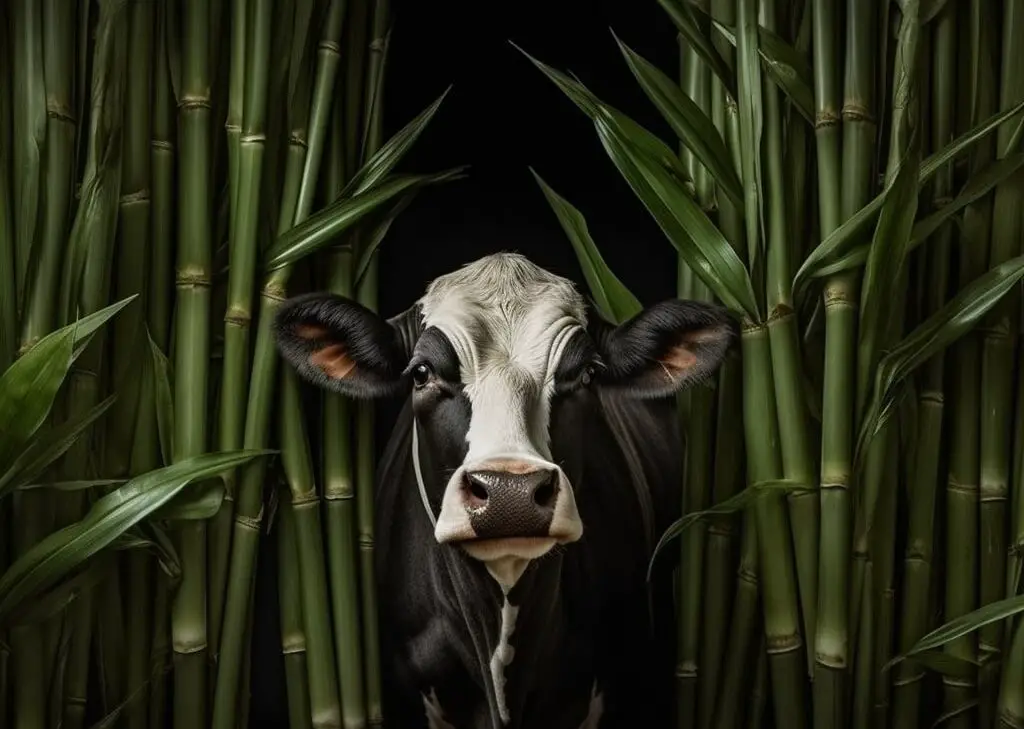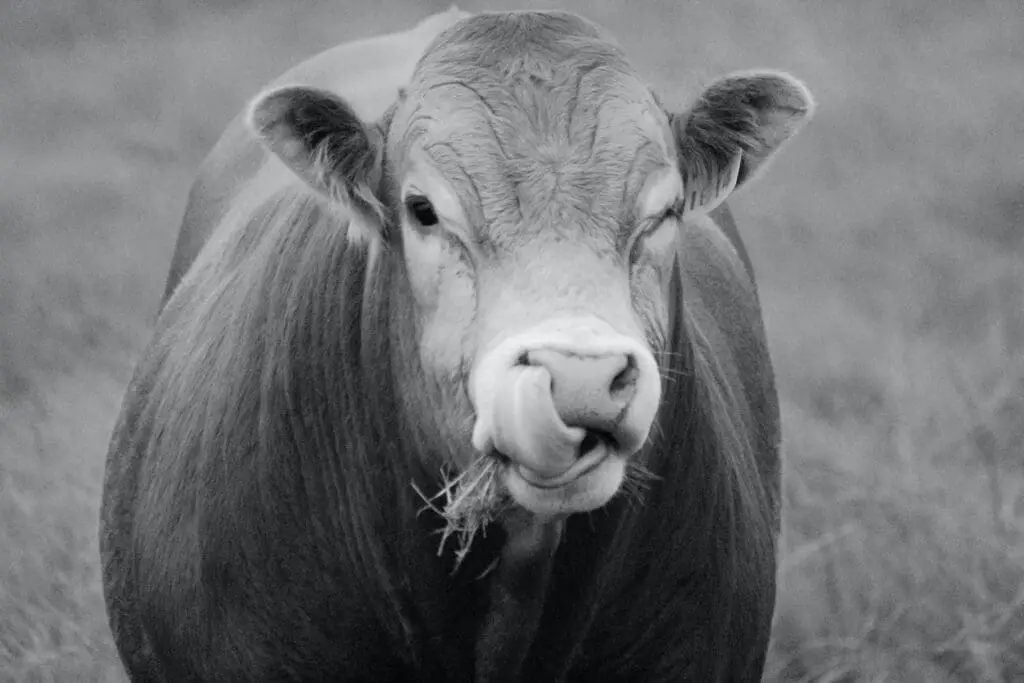Key Takeaways
- Cows can consume small amounts of bamboo, but it is not recommended as a significant part of their diet.
- Bamboo has high fiber content and can promote digestive health in cows.
- Bamboo should not be the sole source of nutrition for cows and should be part of a balanced diet.
- Feeding cattle bamboo can contribute to weight management and environmental sustainability.
- It is important to consider the potential drawbacks and consult with a veterinarian before incorporating bamboo into a cow’s diet.
Introduction
In recent years, there has been growing interest in exploring alternative feed options for livestock. One such option that has gained attention is bamboo. This versatile plant, known for its rapid growth and sustainability, has sparked curiosity among farmers and researchers alike. The question on many people’s minds is, “Can cows eat bamboo?”
As the demand for and eco-friendly practices in agriculture continues to rise, finding alternative fodder sources for livestock becomes crucial. Bamboo, with its abundance and ability to grow in various climates, presents an intriguing possibility.
Can Cows Eat Bamboo?
When it comes to the question of whether cows can eat bamboo, the answer is not a straightforward yes or no. While cows are primarily herbivores and can consume a variety of plant materials, including grasses and hay, bamboo is not a typical part of their natural diet.
Bamboo is a type of grass that is known for its fast growth and high fiber content. It is commonly consumed by animals such as pandas and elephants, but cows have a different digestive system that may not be well-suited for bamboo consumption.

Cows have a complex digestive system that relies on the fermentation of plant materials in their rumen, a specialized chamber in their stomach. While cows can break down cellulose, the main component of plant cell walls, it is unclear whether they can efficiently digest the tough and fibrous bamboo.
Furthermore, bamboo contains certain compounds, such as silica, that may be difficult for cows to process. Silica can be abrasive to the teeth and may cause dental issues in cows if consumed in large quantities.
Therefore, while cows may be able to consume small amounts of bamboo, it is not recommended to include it as a significant part of their diet. It is important to provide cattle with a balanced and nutritionally appropriate diet that consists of grasses, hay, and other feed sources that are more suitable for their digestive system.
Nutritional Value of Bamboo for Cows
Bamboo is a type of grass that is known for its fast growth and high fiber content. When it comes to the nutritional value of bamboo for cows, it can be a valuable addition to their diet.
One of the main benefits of bamboo for cows is its high fiber content. Fiber is essential for proper digestion in cows, as it helps to regulate their digestive system and prevent issues such as bloating or constipation. Bamboo can provide cows with a good source of dietary fiber, which can contribute to their overall digestive health.
In addition to fiber, bamboo also contains various minerals and vitamins that can be beneficial for cows. It is rich in potassium, which is important for maintaining proper muscle function and electrolyte balance in cows. Bamboo also contains small amounts of calcium, magnesium, and manganese, which are essential for bone health and overall metabolic function in cows.
However, it is important to note that bamboo should not be the sole source of nutrition for cows. While it can provide some beneficial nutrients, cows still require a balanced diet that includes other forages and concentrates. Feeding cows a diet solely consisting of bamboo may not provide them with all the necessary nutrients they need for optimal health and productivity.
Potential Benefits of Bamboo for Cows
Bamboo can potentially offer several benefits to cows as part of their diet. Here are some potential advantages of feeding bamboo to cows:
1. High Nutritional Value: Bamboo is rich in nutrients such as protein, fiber, and minerals. These nutrients can contribute to the overall health and well-being of cows.
2. Digestive Health: The high fiber content in bamboo can promote healthy digestion in cows. It can help regulate bowel movements and prevent digestive issues such as constipation.
3. Weight Management: Feeding cows with bamboo can help in weight management. The fiber in bamboo can provide a feeling of fullness, reducing the cows’ appetite and preventing overeating.
4. Environmental Sustainability: Bamboo is a fast-growing plant that requires minimal water and pesticides to grow. By incorporating bamboo into cows’ diets, it can contribute to sustainable farming practices and reduce the environmental impact of livestock farming.
5. Alternative Feed Source: In regions where traditional feed sources may be limited or expensive, bamboo can serve as a viable alternative. It can provide a cost-effective and readily available feed option for cows.
However, it is important to note that the potential benefits of feeding bamboo to cows may vary depending on factors such as the specific type of bamboo, the cow’s individual dietary needs, and the overall management practices. It is recommended to consult with a veterinarian or animal nutritionist to determine the appropriate inclusion of bamboo in a cow’s diet and ensure it meets their nutritional requirements.
Drawbacks of Bamboo for Cows
While bamboo can provide some nutritional benefits for cows, there are also several drawbacks to consider when incorporating it into their diet.
One major drawback is the high fiber content of bamboo. Cows have a unique digestive system that is designed to break down and extract nutrients from grasses and other forage. However, bamboo contains a high amount of fiber, which can be difficult for cows to digest. This can lead to digestive issues such as bloating, gas, and even colic in severe cases.



Another drawback is the potential for toxicity. Some species of bamboo contain compounds that can be toxic to cows if consumed in large quantities. These compounds, known as cyanogenic glycosides, can release cyanide when ingested. While the levels of cyanide in bamboo are generally low, it is still important to monitor the amount of bamboo that cows consume to prevent any potential toxicity.
Additionally, bamboo can be quite tough and fibrous, which can pose a choking hazard for cows. If the bamboo stalks or leaves are not properly broken down or chewed, they can become lodged in the cow’s throat, leading to choking or other respiratory issues.
Overall, while bamboo can provide some nutritional benefits for cows, it is important to consider the potential drawbacks and limitations. It is recommended to consult with a veterinarian or animal nutritionist before incorporating bamboo into a cow’s diet to ensure it is safe and appropriate for their specific needs.
Is it Safe for Cows to Eat Bamboo?
One of the main concerns when considering whether cows can eat bamboo is the safety aspect. It is important to determine if bamboo poses any risks or potential harm to cows when consumed as part of their diet.
Bamboo is generally considered safe for cows to eat. However, there are a few factors to consider. Firstly, it is crucial to ensure that the bamboo being fed to cows is free from any pesticides or chemicals that could be harmful to their health. Organic bamboo or bamboo grown specifically for animal consumption is recommended.
Another aspect to consider is the age and maturity of the bamboo. Young bamboo shoots are generally more tender and easier for cows to digest compared to mature bamboo stalks. Therefore, it is advisable to feed cows younger bamboo shoots rather than the tougher stalks.
Additionally, it is important to introduce bamboo gradually into a cow’s diet to allow their digestive system to adjust. Sudden changes in diet can cause digestive issues in cows, so a gradual transition is recommended.
Overall, as long as the bamboo is free from harmful substances, and the cows are introduced to it gradually, it is generally safe for cows to eat bamboo. However, it is always best to consult with a veterinarian or animal nutritionist to ensure that the specific needs and requirements of the cows are met when incorporating bamboo into their diet.
Frequently Asked Questions
Q: Can cows eat bamboo?
A: Yes, cows can eat bamboo. Bamboo is a nutritious and readily available source of fodder for livestock.
Q: What is the nutritive value of bamboo for cows?
A: Bamboo leaves have a high crude protein content, making them a valuable feed option for cows.
Q: Can bamboo be used as forage for cows?
A: Yes, bamboo can be used as forage for cows. Its nutritious green leaves are particularly suitable for grazing ruminants.
Q: How can cows access the bamboo leaves?
A: Cows can reach the bamboo leaves by grazing in pastures where bamboo is grown or by providing them with fresh bamboo as part of their diet.
Q: Is there any issue with cows digesting bamboo?
A: Cows have the ability to digest bamboo effectively, especially the tender and young shoots.
Q: Can cows eat the woody parts of bamboo?
A: Cows mainly consume the leaves of bamboo as they are more nutritious, but they may also eat the stems to some extent.
Q: What are the advantages of using bamboo as fodder for cows?
A: Using bamboo as fodder for cows provides a sustainable and abundant source of feed. Additionally, it can contribute to rural development and the utilization of bamboo groves.
Conclusion
In conclusion, while cows are primarily herbivores and can consume a wide variety of plant materials, including grasses and hay, bamboo is not an ideal food source for them. Cows have evolved to efficiently digest and extract nutrients from fibrous plant materials, but bamboo poses certain challenges for their digestive systems.
Bamboo is known for its high fiber content, which can be difficult for cows to break down and digest. This can lead to digestive issues such as bloating, gas, and even colic in cows. Additionally, bamboo contains certain compounds, such as silica, that can be abrasive and potentially harmful to the delicate lining of a cow’s digestive tract.
While there may be some nutritional value in bamboo for cows, such as its protein and mineral content, it is not enough to outweigh the potential risks and drawbacks. Cows require a balanced diet that provides them with the necessary nutrients for growth, reproduction, and overall health, and bamboo alone cannot fulfill these requirements.
Therefore, it is recommended to avoid feeding bamboo to cows as a significant part of their diet. Instead, it is best to stick to traditional forage options such as grasses, hay, and other plant materials that are more easily digestible and provide a well-rounded nutritional profile for cows.
In conclusion, while cows may be curious about bamboo and may nibble on it occasionally, it is not a suitable or safe food source for them to rely on as a primary part of their diet.”

